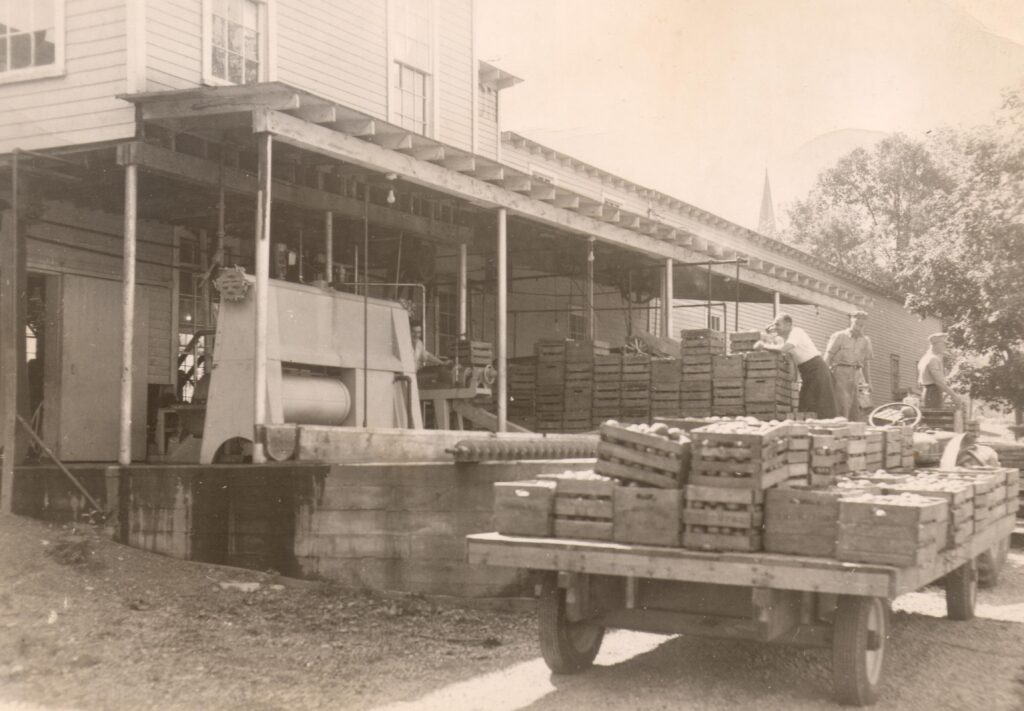This mini-documentary produced by History Lives Here and Windswept Productions showcases the 100 -year history of the Sprague Cannery of Belleville. The production was launched at an anniversary event held on August 16, 2025 in Picton.
“As a kid,” says Rick Sprague, “the best Saturday was when my Dad said I could go with him to the canning factory because it was just a magical place for me with all the people and all the machinery and everything. And the smells. I just loved it.”

Sixty years later, Rick is still enthusiastically showing up for work every day at the family business – Sprague Cannery, a Belleville company that is the sole survivor of the once thriving canning industry in the area. For him, there is still a magic to the place – and plenty of savoury smells. This year the company is celebrating its 100th anniversary, a business success story that embodies constant challenge overcome by continuous adaption, technological change, market diversification, and sheer stubbornness.
The company began in August 1925. That’s when Rick’s great – grandfather decided to gamble in the canning gold rush in his hometown of Prince Edward County, Ontario. Grant Sprague was already a successful entrepreneur with a farm, grocery store, and telephone company, the area’s first telephone service. But he was always on the lookout for new ventures.
The area’s canning industry was booming in the 1920s. From the 1880s until the 1960s, Prince Edward County was so dominant within the Canadian canning industry, it was known as ‘The Garden County of Canada.” It was a hot, tough business battling the traditional hardships of farming everywhere – drought, frosts, and pests. In the early days, brutal monopolistic contracts from the larger firms left few options for most farmers to sell their crops. But over time, independent companies like Sprague offered an alternative market to farmers and jobs for their families.
Grant Sprague did not stay long with his new canning factory in the hamlet of Mountain View. It wasn’t the hardships. It just didn’t fit his dress code.
“He liked to wear a suit,” says Rick. “And a suit and a canning factory did not jive well. So, his son, Jay, who was my grandfather, took over the very next year. And it was run as a seasonal operation 6-7 weeks a year – mainly as a tomato canner, tomato juice, some pumpkin, raspberries, and some cream corn. And that ran for many decades.”
But times were changing and becoming more turbulent. Two wars and a depression had artificially kept the local industry going. After the Second World War, the canning business rationalized and moved to southwestern Ontario with its more fertile land and longer growing season. Labour and environmental laws imposed stricter regulations on local firms. New products – like frozen food – were gaining market share at the expense of canned goods. Chain stores wanted canned goods “on demand” forcing companies to build heated storage facilities. The 1960s brought a tsunami wave of profound change. Ultimately, the industry that once meant everything to The County was gone for good, and the days of canned products seemed doomed.
“My grandfather died of a heart attack suddenly in 1967,” Rick remembers. “And then my Dad, [Roger] a 32-year old, was faced with a decision. He knew that a seasonal canning factory of that scale canning six weeks a year, probably didn’t have a long future. So, he looked at a different approach… And he looked to Toronto and Montreal. There were different ethnic communities that were growing and needed their own unique foods. And he identified beans as a great opportunity to can all year round and extend from the tomato season to the next tomato season to keep the plant working. And so, he built a new plant at that point in order to can through the winter and developed some good relationships with ethnic-based companies in Toronto and Montreal, mostly with a couple of key Italian companies, and started canning chickpeas and red kidney, lentils, white kidney and Romano beans and on and on it goes…because he believed there was a future in foods that were better than what was on the market.”

In 1995, the firm built a new processing facility in Belleville. The new plant was an opportunity to introduce new design ideas and technology. The Spragues abandoned traditional factory floor plans in favour of a more open concept that created efficiencies, but was considered so radical, the design plans needed government approvals. They bought new technology from Europe to modernize operations. And when a Campbell’s Soup plant in Ontario closed in 2019, they bought 20 truckloads of equipment. The automated filling and can capping equipment, large, super-heated water retorts to cook and cool canned products and labelling equipment dramatically increased production capacity. Today, the plant can process 350 cans of products every minute. And the company produces around 50 different canned goods from soups to chili to beans exported across Canada and The United States and new markets in Europe and Asia.
“As a little boy, I was so excited to go to work,” says Rick. “And here I am today, and I feel the same excitement. I walk into this place each morning and hear everything, the smells, and the people and what we are doing and the challenges. And I just love it. So, I feel very fortunate… And it’s just not making it to 100 years, but really in our 100 – year history, we are at a much better place than we have ever been with our brand, the types of products we’re producing, and the growth potential. It’s a great feeling.”

